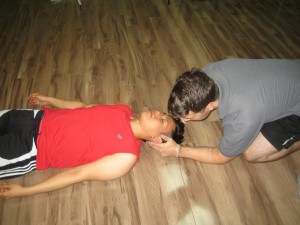Heat exhaustion is defined as an increase in the core body temperature accompanied by fluid loss. The condition must be detected early, and treatment must be started right away. Take note that heat exhaustion can progress to heat stroke if not promptly treated.
Once the internal temperature of the body increases, the normal response is to sweat and cooled by evaporation. In case the humidity is high where sweat could not evaporate or already dehydrated, the body could not cool itself rapidly enough and the core temperature rises.
Who are at risk?
Anyone is at risk for heat exhaustion if in a warm environment, especially if not replacing the fluids lost via sweating.
- Obese individuals
- Infants and children ages 0-4
- Elderly
Move the individual to a cooler environment, preferably with air-conditioning. - Individuals with high blood pressure
- Those who are working or exercising under the heat
What are the indications?
- Dizziness or fainting
- Weakness
- Headache
- Warm, pale, moist skin
- Excessive sweating
- Nausea and/or vomiting
Management of heat exhaustion
If an individual is experiencing the initial signs of heat exhaustion, some of the self-care measures include:
- Move the individual to a cooler environment, preferably with air-conditioning.
- Provide cool beverages that can help cool down the individual internally. Avoid any alcoholic beverages. An electrolyte-replacement sports drink is the ideal choice if the individual has been sweating.
- Sponge the individual with cool water. If available, encourage the individual to take a cool shower.
- Change into lightweight clothing to allow the perspiration to evaporate.
When to consult a doctor?
If the symptoms are starting to get worse or last longer than an hour, seek medical attention.
Indications of a medical emergency
If the following are present, call for emergency assistance:
- If the individual could not follow commands or loses consciousness.
- Individual stops sweating or loses consciousness is an indication of heat stroke.
More Information / Disclaimer
The information posted on this page on heat exhaustion is for learning purposes only. Learn to recognize the signs and how it is managed by taking a standard first aid course with Toronto First Aid.

